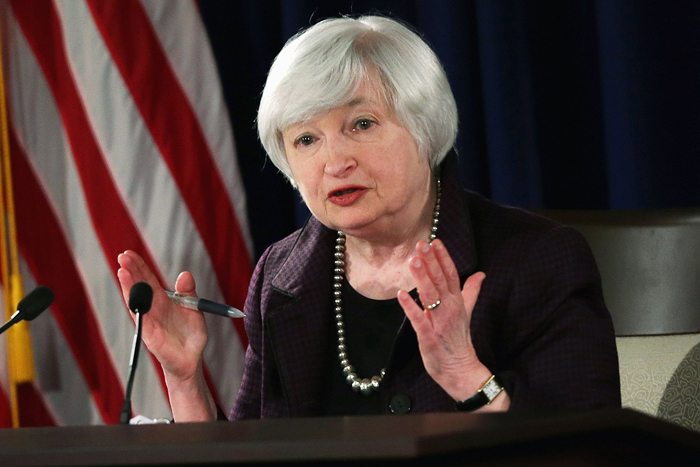By Andrew Moran
President Joe Biden’s $1.9 trillion American Rescue Plan did contribute to inflation, Treasury Secretary Janet Yellen conceded on Wednesday.
Speaking in an interview with Matt Murray, editor-in-chief of The Wall Street Journal, the former head of the Federal Reserve admitted that the White House’s enormous spending had played a role in today’s inflationary environment, adding that it was “justified” due to the various economic risks.
“So, look, inflation is a matter of demand and supply, and the spending that was undertaken in the American Rescue Plan did feed demand,” she said.
She added that today’s 40-year high inflation was an unintended consequence of the Biden administration attempting to avoid a sharp economic downturn and facilitate full employment.
Yellen further explained that the fiscal stimulus and relief package had to support the labor market in response to the many dire forecasts.
“But I do think it was justified and appropriate at the time, given the risks the economy faced,” the treasury secretary stated. “At the time that President Biden was inaugurated, we had an economy where forecasters were envisioning very high unemployment for a very long time. We had especially low-wage workers who had been laid off in massive numbers. We saw cars lined up for miles in food banks, Americans worried about not being able to feed their families, get enough to eat. Forecasts were really quite dire.”
Yellen touched upon the overall economy in her interview, noting that “the outlook is very uncertain” due to the panoply of risks. Some of the threats to the post-crisis economy are surging commodity prices, the spillover effects from the war in Eastern Europe, and broader global growth prospects.
Still, she anticipates solid growth and a potential “soft landing” for the U.S. economy.
“I do believe we’re going to see solid growth in the coming year,” Yellen averred. “The Fed will need to be skillful and also lucky, but I believe it’s a combination that is possible.”
The Federal Reserve raised the benchmark interest rate by 50 basis points on Wednesday, the biggest increase in more than 20 years, to fight inflation. Fed Chair Jerome Powell purported at a press conference after the Federal Open Market Committee (FOMC) policy meeting that he thinks there is “a good chance to have a soft—or softish—landing or outcome.”
Inflation Causes
A March NBC News poll found that 38 percent of Americans blamed Biden and his policies for rampant price inflation.
Another Emerson College Poll reported that 39 percent identified the current administration as the cause of today’s higher cost of living.
Do economists and market experts share this same opinion?
Former Treasury Secretary Larry Summers had been warning that the American Rescue Plan would trigger inflationary pressures when the legislation was first proposed last year.
“We must make sure that it is enacted in a way that neither threatens future inflation and financial stability nor our ability to build back better through public investment,” Summers wrote in an op-ed in The Washington Post.
A year later, he acknowledged that the White House failed to heed these warnings, adding that a hefty rescue bill “would endanger much of the Build Back Better agenda,” he penned in another Washington Post opinion piece.
Obama-era economic advisor Stephen Rattner echoed Summers’ inflation concerns, ringing alarm bells that the immense deficit-financed fiscal expansion in 2021 played a significant factor in today’s elevated consumer price index (CPI).
“The $1.9 trillion American Rescue Plan passed in the early days of the Biden administration will go down in history as an extraordinary policy mistake,” Rattner said in an op-ed for The New York Times last month.
In October, the San Francisco Fed Bank predicted that American Rescue Plan would contribute to elevated inflation in 2022, adding to the personal consumption expenditure (PCE) price index, the Fed’s favorite inflation gauge.
The PCE price index surged to 6.6 percent in March, the sharpest jump on record.
“The estimated impact of the American Rescue Plan on inflation is meaningful, but it is still a far cry from the strong overheating of the 1960s,” the research paper stated.
Several months later, the same regional institution noted in its Economic Letter that both the $2.2 trillion CARES Act and American Rescue Plan added to the present-day inflationary environment through “an unprecedented injection of direct assistance with a relatively short duration.”
Stephen Moore, a former member of The Wall Street Journal editorial board and co-founder of the Club for Growth, argued on Fox Business in February that overspending “lit the match” of this inflationary tidal wave.
“This is a self-inflicted wound by policies that came into place as soon as Biden came into office,” he said.
Many economists and market observers concluded that too much money had been injected into the economy and pursued too few goods.
However, for the last 15 months, Biden has dismissed assertions that his policies have been culpable for inflation. When he entered the White House, the administration denied its stimulus and relief efforts would lead to inflation.
Once prices were elevated, the Oval Office parroted the Fed and claimed it would be transitory. By the end of 2021, Biden insisted that inflation had peaked. The latest message is that heightened inflation is a result of Russia’s invasion of Ukraine, referring to it as “Putin’s price hike.”
But will the U.S. president’s next spending campaigns lead to additional inflationary pressures in the economy?
The trillions estimated for Biden’s social and infrastructure plans “should not have any real material impact on inflation,” said William Foster, vice president and senior credit officer (Sovereign Risk) at Moody’s Investors Service
Mark Zandi, a chief economist at Moody’s Analytics, agrees, averring that they “do not add to inflation pressures, as the policies help to lift long-term economic growth via stronger productivity and labor force growth.”
Next week, the April annual inflation rate will be released.
Some believe that the inflation rate may have peaked and could start to ease, but prices will remain elevated and far from the Federal Reserve’s 2 percent target.






